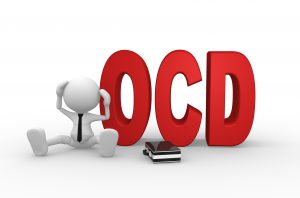Obsessive compulsive behaviours may occur following a significant Acquired Brain Injury (ABI). There are two essential features of this problem:
- Recurrent, intrusive obsessional thoughts and impulses which cause high levels of anxiety and distress. The person is unable to ignore and dismiss these thoughts.
Compulsive, repetitive behaviours which the person is driven to perform in response to the obsession in order to reduce anxiety and distress. Common obsessions include a fear of contamination (e.g. washing/cleaning excessively), thoughts about exactness (e.g. wanting things to be kept in a particular order) and checking behaviours (e.g. repeatedly checking that doors and windows are locked).
Common obsessions include a fear of contamination (e.g. washing/cleaning excessively), thoughts about exactness (e.g. wanting things to be kept in a particular order) and checking behaviours (e.g. repeatedly checking that doors and windows are locked).
Compulsive behaviours may cause the person to experience health problems e.g. excessive hand washing can lead to skin irritation. Obsessions with ‘order’ may lead to unhelpful ritualistic behaviours developing which can impact on activities of daily living, social relationships and on work etc. This problem may occasionally lead to the person displaying decreased tolerance, irritability, hostility and at times aggressive outbursts.
Following brain injury obsessive compulsive behaviour is more likely to occur in the person who experiences anxiety and/or depression. Cognitive impairments, in particular memory and executive functioning difficulties increase the risk of these problems developing. Cognitive impairment (including lack of insight) may result in the person being unable to view these behaviours as problematic. They may be unable to understand the harmful impact on their own lives and the lives of those around them.
It is important to be aware that the person with memory difficulties may develop the habit of excessively checking things and needing things to be kept in a particular place/order at home or at work. This may resemble obsessive compulsive behaviour however it may be a helpful adaptive response to their difficulties.